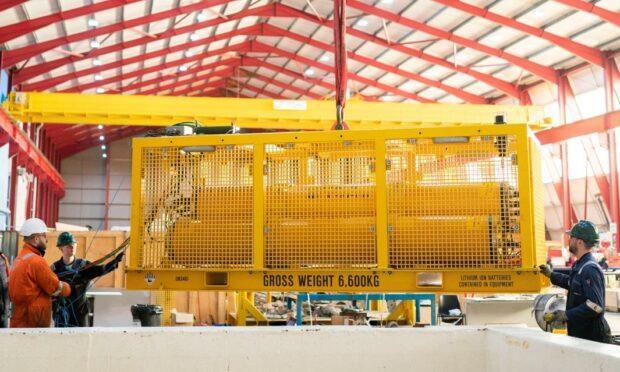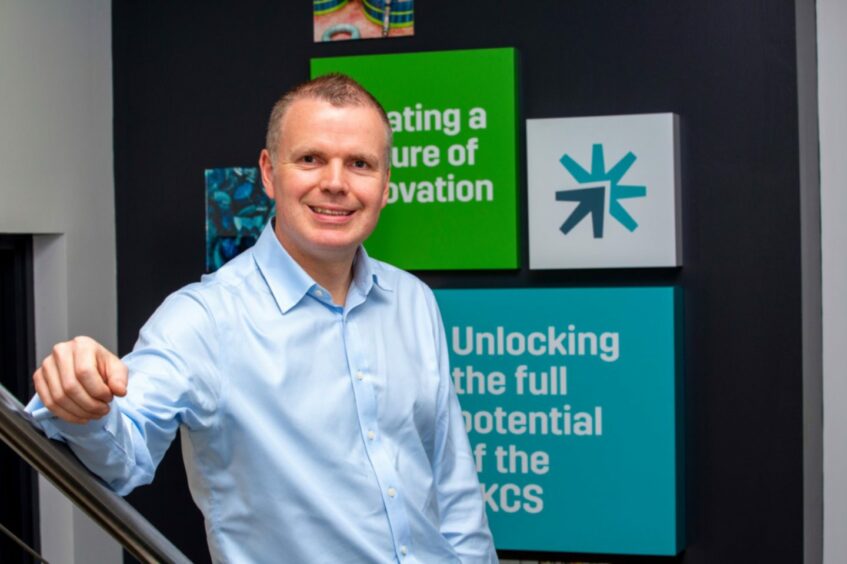
Subsea energy storage technology developed in Aberdeen is at the heart of an offshore power sea trial at a US Navy test site off the coast of Hawaii.
The north-east link is through Aberdeen firm EC-OG and its Halo “smart” battery system.
Halo will be integrated into a sea trial at the US Navy’s wave energy test site off the island of Oahu.
The lithium-ion based technology will feature as part of an autonomous offshore power system (AOPS) being tested by US-based ocean energy systems developer Columbia Power Technologies (C-Power) in partnership with the US Department of Energy, as well as companies such as Saab, BioSonics and Franatech.
Saab, a world leader in electric underwater robotics, will pair the AOPS with its Sabertooth autonomous underwater vehicle, which is essentially a sea drone.
As part of C-Power’s SeaRAY wave energy converter, Halo will help to deliver uninterrupted power, data and communications for the whole system – ensuring continuous energy availability for remote subsea operations.
EC-OG said the completed first commercial delivery of its subsea battery storage system to the client for onward transportation to Hawaii was a “significant company milestone”.
Paul Slorach, business development director at the firm, added: “The EC-OG team is excited to export our first Halo unit to Hawaii and be part of this innovative and world-first demonstration project alongside our client, C-Power, and other project partners.
“This is a crucial project for the industry which will demonstrate the integration of a selection of novel subsea technologies to deliver a reliable source of power as well as real-time, over-the-horizon data communications.
“Learnings from this project will be significant for the development of the blue economy and further decarbonisation of offshore operations globally.”
Martyn Tulloch, head of energy systems integration at the Aberdeen-based Net Zero Technology Centre, said: “EC-OG’s success in exporting their Halo subsea battery storage technology to this project in Hawaii highlights the strength of both the technology and the EC-OG team.
“This innovative Aberdeen-based company has harnessed engineering expertise developed in the north-east to create a product that has applications in emerging global renewable energy markets.
“We are pleased to have supported EC-OG’s journey – most recently via our Renewables for Subsea Power project, where the Net Zero Technology Centre and industry partners Harbour Energy and Baker Hughes are supporting EC-OG, wave energy pioneers Mocean Energy and AUV (autonomous underwater vehicle) specialist Modus to develop a system to power subsea tiebacks or residential AUVs.”
C-Power’s portable, bright yellow AOPS device is designed to support unmanned offshore activities, including subsea vehicles, sensor packages and operating equipment.
It makes clean energy from the motion of the ocean’s waves and collects and sends data, rather like an oceanic mobile phone mast.
C-Power chief executive Reenst Lesemann said: “EC-OG’s Halo system is an ideal complement to C-Power’s wave energy converters.
“When combined, the ocean changes from a power desert to a power and data-rich environment for customers who are ready to unleash a wave of innovation in the ocean economy.”
Clean energy focus
EC-OG, which stands for East Coast Oil and Gas Engineering, was founded in April 2013 by managing director Richard Knox and former engineering director Rob Cowman.
The company is based in Davidson House at Aberdeen Innovation Park, Bridge of Don.
It is focused on converting ocean currents into renewable energy for remote subsea locations.
The firm’s technology is built around cable-free power delivery and energy storage systems for offshore applications.
These are said to reduce the cost of repairing or replacing umbilicals after all-too-common power failures.
Halo is described by EC-OG as a “modular and scalable” method of battery storage.
It is intended to give clients a “zero-emission power system at a fraction of the cost of traditional methods of power delivery”.
Recommended for you

